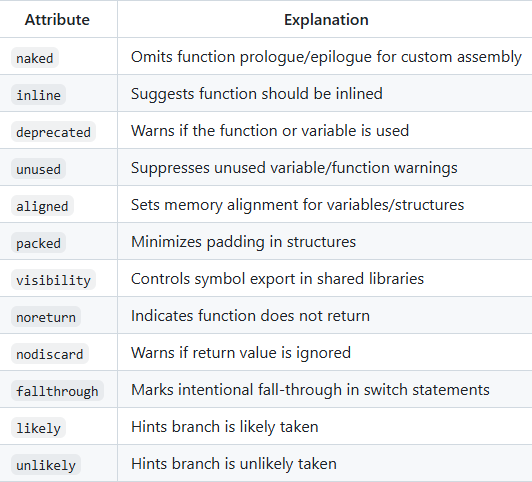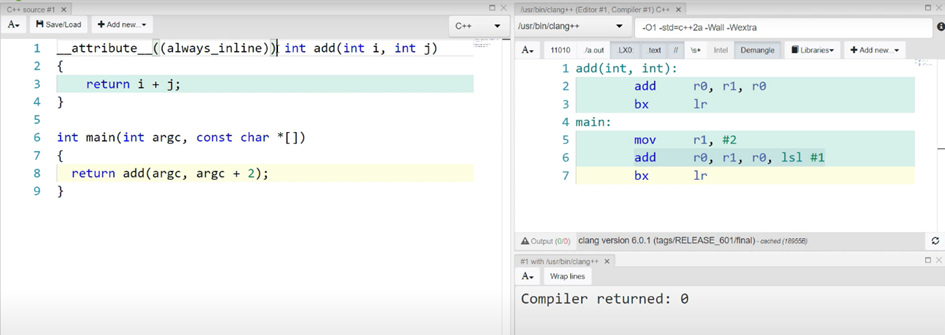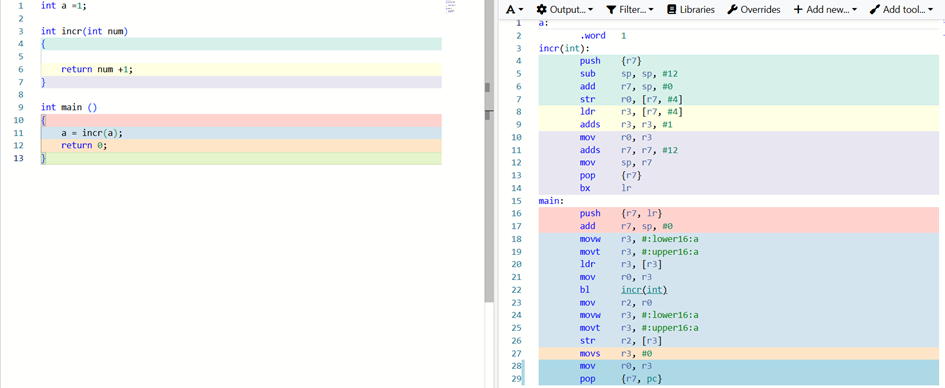GCC Attributes: Silent Compiler Superpowers
1. Introduction
In the process of developing applications in C or C++, programmers typically concentrate on business logic, data structures, and algorithms core elements that underpin robust software design. However, there are occasions when it becomes necessary to communicate additional intentions to the compiler, guiding its treatment of the code without modifying its essential logic. For instance, one may wish to instruct the compiler to preserve a function even if it appears unused, to align a structure on a particular memory boundary, or to specify that a function does not return.
To address such requirements, the GCC compiler offers a particularly valuable feature: attributes. These attributes serve as annotations that can be attached to function, variable, or type declarations, enabling developers to influence the compiler’s behavior during compilation.
2. What Are GCC Attributes?
GCC attributes are specialized annotations that can be applied to functions, variables, or types, providing the compiler with additional semantic information beyond its default assumptions. By explicitly specifying how GCC should handle a particular declaration such as whether it is safe to optimize, how it should be arranged in memory, or if it may produce side effects developers gain fine-grained control over the compilation process.
It is important to note that attributes influence the behavior of the compiler at compile time, rather than affecting the program’s runtime execution. Their primary purpose is to help GCC generate code that is safer, more efficient, or better suited to specific requirements, all without incurring any runtime overhead. However, as with any powerful feature, attributes should be used judiciously because improper use can result in undefined behavior or portability concerns.
Enabling attributes is straightforward: with a simple annotation, the compiler’s behavior can be tailored to meet the needs of the application.
3. Syntax
GCC supports two distinct syntaxes for specifying attributes: the modern standard syntax using double square brackets, and the older GNU extension syntax based on the __attribute__ keyword. The standard syntax, written as [[attribute]], was introduced with C++11 and later adopted by the C23 standard. It is now recognized by GCC when compiling C++ code with -std=c++11 or newer, and C code with -std=c23 or -std=gnu17 or newer. This approach aligns with the evolution of the language standards and offers improved portability and clarity.
Despite the adoption of the standard syntax, the GNU extension form __attribute__((attribute-list)) remains prevalent, especially in legacy codebases and projects that rely on GCC-specific features. This syntax allows developers to attach one or more attributes to declarations, providing fine-grained control over compilation and optimization. Attributes can be simple names, such as unused, or names accompanied by parameters, like format or alias, which accept identifiers, expressions, or lists as arguments.
When using attributes in the standard syntax, it is important to note that GCC-specific attributes must be prefixed with gnu::, for example [[gnu::section]].
4. Common Attributes
Below is a summary of frequently used GCC attributes and their purposes:

Fig. 1 – Common GCC attributes with their purpose
5. Practical Examples of GCC Attribute Use Cases
When you're diving into the world of C attributes, one of the most immediate benefits you can grasp revolves around performance, especially with functions that are incredibly tiny.
Let's take a look at a classic example with a simple add function.

Fig. 2 – Assembly of a normal add() function
Without specific instructions, the compiler generates a traditional function call (see the b add(int, int) in assembly). This involves a branch, which adds a slight overhead a small cost, but one that accumulates for very frequent or tiny operations.
By adding __attribute__((always_inline)), we instruct the compiler to replace the function call with the function's body directly. The key benefit? Zero function call overhead. The add operation's instructions are now part of main's flow, eliminating the branch and associated setup. For critical, minuscule functions, this directly translates to faster execution and more efficient CPU pipeline usage, making it a powerful tool for micro-optimizations

Fig. 3 – Assembly of an inlined add() function
Alright, let's move onto another powerful attribute that gives you incredibly fine-grained control: naked. This one is for the truly low-level tasks, where you need to get as close to the hardware as possible.
Typically, when you write a C function, even an empty one, the compiler adds some 'boilerplate' code around your logic. This is essential for proper function calls – things like setting up the stack frame, saving registers that the function might modify, and then restoring them before returning. It’s called the function prologue and the function epilogue.

Fig. 4 – Assembly of a normal increment() function
Now, let's see what happens when we apply the naked attribute:

Fig. 5 – Assembly of an naked increment() function
By marking incr_naked with __attribute__((naked)), we're giving the compiler a very strong directive: do not generate any prologue or epilogue code automatically. Look at the assembly now! The push, sub, and pop instructions are entirely gone from our function.
The immense benefit here is total control. naked allows you to take over the entire function's entry and exit mechanics. This is absolutely critical for tasks like writing interrupt service routines (ISRs), operating system kernels, or bootloaders, where you must precisely manage the CPU's state, registers, and stack without any compiler interference. It removes all automatic overhead, giving you the bare minimum, allowing you to craft every single assembly instruction for highly specialized or time-sensitive scenarios where every cycle and every byte matters. This attribute effectively turns a C function into a direct assembly wrapper, granting unparalleled low-level power.
Now, let's explore a different type of attribute related to other data structures.

Fig. 6 –Packed vs. unpacked struct layout
The __attribute__((packed)) directive is important in this case because it eliminates padding bytes that the compiler normally inserts between struct members to align them for efficient memory access. Without packing, the UnpackedStruct has 12 bytes due to alignment padding . With packed, the struct is stored exactly as defined byte-by-byte resulting in only 6 bytes. This is useful when interfacing with hardware where memory layout must match a specific format, such as in communication protocols.
6. Conclusion
GCC attributes quietly shape how code meets hardware, letting you optimize, silence warnings, and control layout with precision. Their true power is subtle felt in every tight loop and packed struct. They don’t replace good design, but reward those who master both language and machine. For seasoned developers, attributes are a secret handshake with the compiler. Sometimes, all it takes is a single, well-placed annotation.